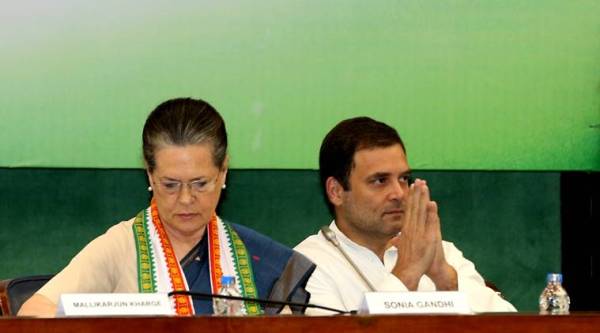Don’t hold your nose
Congress needs to frame a cogent stand on coalitions rather than looking at them merely as tactical necessity

UPA chairperson Sonia Gandhi with Congress president Rahul Gandhi during the CWC meeting in New Delhi. (Express Photo/Renuka Puri/File)
With the Congress’ resounding defeat in 2014, the UPA had practically withered away, while the clear majority won by the BJP had made the NDA all but redundant. But now, coalitions are back again. Early this year, it became clear that if the national mood remains as it is now, the BJP is unlikely to reach even 225 seats. Suddenly, the BJP president has been busy visiting allies, from Mumbai to Patna.
On the other hand, the Congress has been talking of an anti-BJP front because it realises that more than improving its 2014 performance, it has to ensure the ouster of the present government. The decision to forge a post-election coalition in Karnataka was an important step. The recent decision of the Congress Working Committee (CWC) to authorise Rahul Gandhi to enter into pre-poll arrangements further opens the door for the revival and rejuvenation of coalition politics.
The debate and vote during last week’s no-confidence motion nonetheless deserve mention in this regard for two reasons. The motion helped the Congress gain both publicity and self-confidence. But the debate lacked coordination among Opposition parties on arguments against the government. There was an awkward division of labour where state parties focused on issues specific to “federalism” and the Congress talked mainly about more general issues as if state specific issues did not matter to it.
Besides the absence of a common strategy, the no-confidence motion also exposed the limits of bringing state parties together since both the BJD and TRS refused to vote against the government. The BJP’s opponents may gloat over the behaviour of the Shiv Sena but the fact remains that the Congress and NCP in Maharashtra have failed to bring an actual separation between the BJP and Sena.
But the irony is that despite these visible limits, there is no escaping coalitions. For the BJP, in all probability, post-poll alliances make far more sense. In its core territory, the BJP has already reached the maximum and can only be expected to lose seats. So, it would be heavily dependent on gaining seats in new territories and would not want to share seats in states where it aims to expand its base. It would be only after elections that the party would know how far away from a majority it stands and then accordingly do business with whoever is willing.
On the other hand, for the state parties, pre-poll alliances make sense. Parties like the TMC, BJD or TDP for instance, would need to fight anti-incumbency and an assault from the BJP. This can be done either by aligning with the BJP or by firming up an anti-BJP alliance before elections. The BJP’s prevarication in forging pre-poll alliances can therefore work in favour of the Congress as an opportunity to weave an anti-BJP coalition in advance. State parties have no direct stakes in what happens in other states and yet they cannot be indifferent to the all-India outcome. This would mean that at least some state parties would be willing to entertain the idea of a pre-poll alliance as is seen in the case of the SP and BSP in UP. The treatment of its partners by the BJP and its hegemonic ambitions have left most state parties wary of it. While the BJP has gained in this game by having the JD(U) on its side in the crucial state of Bihar and also by becoming the manager-cum-arbiter of the beleaguered AIADMK, the field is more amenable for an anti-BJP alliance.
Overtures by the Congress and the recent decision by the CWC are critical because an anti-BJP coalition can easily take the form of a 1989-like “third front” that would both hurt the Congress and make it easier for the BJP to win more seats. It thus becomes incumbent upon the Congress to take the initiative and yet be prepared for compromises, including on the question of leadership of the coalition.
Details of actual CWC deliberations on this issue are not yet known. The decision to “authorise the party president” to take decisions in this regard is more evasive than illuminating. In the absence of a cogent policy of coordination and cooperation with non-BJP parties, the resolve to displace the BJP or to save the country from the BJP can only be a nominal declaration. Having been reduced to 40-odd seats and an 18 per cent vote share, the Congress can only improve its performance but that in no way means the possibility of a dramatic turnaround. The Congress today cannot pose an electoral challenge to the BJP on its own, nor can it pose an ideological challenge to the BJP.
Despite having lived through the coalition era over the past three decades and having led a coalition government for two terms, the Congress has never been comfortable with alliance politics either on the ground or in theory. Many veterans of the party continue to believe that alliances are bad and state parties are problematic. They find virtue in the all-India status and long history of the party — both of which have only historical relevance today. That history can enthuse the party worker, but need not be an impediment in engaging with other parties. Those having reservations about coalition politics need to remember that the party’s all-India presence has severe limitations, rendering it a minor player in many states.
In this backdrop, merely “authorising” the party president appears to be too little by way of the CWC’s preparation for pre- and post-election alliances. It is, of course, understandable that all strategising does not and need not take place in full public view. Yet, the party’s resolve to enter into coalitions needed a more articulate expression. The Congress needs to first formulate a cogent stand on coalitions rather than looking at them merely as a tactical necessity. Historically, the Congress always was a party based on coalitions and it now has to adjust to that same approach, but outside its organisational framework. An affirmation of the diversity of views among the non-BJP parties and an admission that it currently does not represent or does not have the confidence of many sections which are supporting state parties might have been far more effective as a message to the public and potential allies.
Above all, in not formally resolving in favour of alliances, the CWC has missed an opportunity to underline a distinction between the BJP and “other” parties with whom it may have a relationship of competition and cooperation. In the atmosphere of uncertainty, a durable and principled approach can become the basis for long-term politics. If the CWC is looking at the Congress’ future beyond 2019, then it needs to formulate a long-term approach rather than just give the party president a free hand.
The writer is co-director, Lokniti programme and chief editor of Studies in Indian Politics
For all the latest Opinion News, download Indian Express App
More From Suhas Palshikar
- Two speeches, a spectacleAt Nagpur, Pranab Mukherjee lost an opportunity. Mohan Bhagwat seized it ..
- The Karnataka lessonFor BJP, reliance on PM could become a limitation. For Congress, electoral discourse must go beyond identities..
- Citizenship rights, not burkaWhy the Harsh Mander-Ramachandra Guha debate must continue — and expand...








































No hay comentarios:
Publicar un comentario